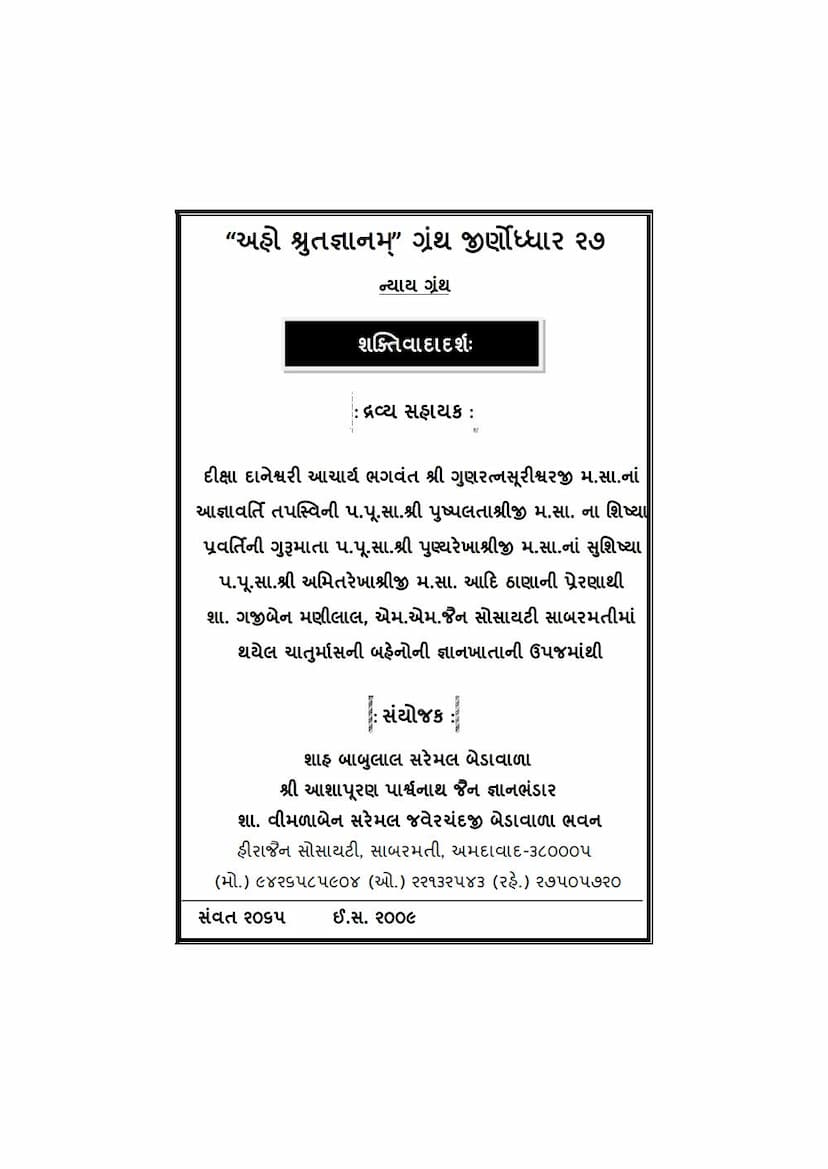Shaktivadadarsha
Added to library: September 2, 2025

Summary
This document appears to be the title page and introductory material for the Jain text Shaktivadadarsha by Sudarshanacharya, published by Khemraj Shrikrushnadas Shreshthi in Mumbai. Here's a breakdown of the information provided:
Book Title: Shaktivadadarsha (शक्तिवादोऽदर्शः) Author: Sudarshanacharya (सुदर्शनाचार्य) Publisher: Khemraj Shrikrushnadas Shreshthi, Mumbai (खेमराज श्रीकृष्णदास श्रेष्ठि, मुंबई) Catalog Link: https://jainqq.org/explore/008430/1
Key Information from the Pages:
-
Page 1:
- Mentions it's a "Nyaya Granth" (न्याय ग्रन्थ) – a text of logic or jurisprudence.
- Indicates it is related to "Shruta Jnana" (श्रुतज्ञान) – knowledge derived from scriptures, and is part of a "Jirnoddhar" (जीर्णोद्धार) project, possibly a revival or restoration of old texts.
- Lists acknowledgments and contributions from various Jain individuals and organizations, including the Khemraj Shrikrushnadas Shreshthi Venkateshwar Press, and the "Shri Ashapuran Parshvanath Jain Gyana Bhandar" in Ahmedabad.
- The publication date is estimated to be around Samvat 2065 / 2009 CE.
-
Page 3:
- This is likely the original title page of the older edition.
- It states the work is Shaktivada (शक्तिवाद), a treatise on the nature of "Shakti" (power or energy), composed by Mahamahopadhyaya Viddavara Shri Gadadhar Bhattacharya (महामहोपाध्याय विद्द्वर श्री गदाधर भट्टाचार्य).
- It is accompanied by the commentary Adarsha (आदर्शाख्य), compiled by Panchnadia (Punjabi) Pandit Sudarshanacharya Shastri (पञ्चनदीय( पंजाबी ) पण्डितसुदर्शनाचार्य शास्त्रि).
- It was published by Khemraj Shrikrushnadas Shreshthi in Bombay (बंबईनगर) in the Vikram Samvat 1970 (वैक्रम संवत् १९७०), corresponding to 1913 CE.
- It mentions that the reprint rights belong to the head of the Venkateshwar Press.
-
Page 5 (Bhumika - Foreword):
- The author, Sudarshanacharya, explains that all spoken and heard matters are dependent on words ("Shabda" - शब्द).
- He states that the text expounds how words convey meaning.
- The original text, Shaktivada, by Gadadhar Bhattacharya, is divided into two parts: "Samanya Khanda" (सामान्य काण्ड) and "Vishesha Khanda" (विशेष काण्ड), dealing with the nature of "Shakti" in general and specific terms respectively.
- He mentions that the commentary on "Vytpatti Vada" (व्युत्पत्तिवाद) by Gadadhar Bhattacharya, which deals with the meaning of suffixes, has also been written by him.
- The foreword concludes with a request to the readers to be understanding of any errors, as even ancient texts may have imperfections.
-
Page 6 (Shuddhipatra - Errata):
- This page lists corrections for the text, indicating various words and page numbers that were printed incorrectly in the original.
-
Page 7 (Vishayanukramanika - Table of Contents):
- This provides a detailed index of the topics covered in the book, including:
- Shakti Swarupam (शक्तिस्वरूपम्) - Nature of Shakti
- Mimamsaka Mate Poorvapaksha: Gyanashakti Vada (मीमांसकमते पूर्वपक्ष: ज्ञानशक्तिवादः) - The Mimamsa school's primary argument: Gyanashakti Vada (theory of knowledge-power).
- Anvitabhidhan Vada (अन्विताभिधानवादः) - Theory of meaning conveyed by connected words.
- Tarka Mat Siddhanta (तर्कमतसिद्धान्तः) - The Siddhanta (conclusion) of the logic (Nyaya) school.
- Various sections on "Samanya Vachak Shabdanaam" (सामान्यवाचकशब्दानां) – words signifying general categories, and "Vishesha Vachak Shabdanaam" (विशेषवाचकशब्दानां) – words signifying specific things, discussing their "Shakti" (power of meaning).
- Examples of words discussed include Dhenu (धेनु - cow), Pushpavanta (पुष्पवन्त - flowery), Tat (तत् - that), Yushmad-Asmad (युष्मदस्मत् - you/I), Sarva (सर्व - all), Kim (किं - what), etc.
- This provides a detailed index of the topics covered in the book, including:
Overall Summary of the Work's Scope (Based on the introductory materials):
The "Shaktivadadarsha" is a significant Jain commentary on the philosophical work "Shaktivada" by Gadadhar Bhattacharya. The original text, rooted in Indian logic (likely Nyaya or a related school), explores the concept of "Shakti" – the power of words to convey meaning. The commentary by Sudarshanacharya aims to elucidate these complex philosophical ideas.
The book delves into:
- The nature of "Shakti": How words derive their power to signify meaning.
- Different schools of thought: It engages with contrasting philosophical viewpoints, particularly those of the Mimamsa school (especially their theories on knowledge-power and interconnected meaning) and the logic (Tarka/Nyaya) school.
- Theories of meaning: It discusses how meaning is conveyed through words, including the concepts of "Sanketa" (convention/designation) and "Lakshana" (metaphorical or indirect meaning).
- Analysis of words: A substantial portion of the work appears to be dedicated to analyzing the "Shakti" of various words, categorizing them as general (Samanya) or specific (Vishesha), and explaining how their meaning is derived and understood within different philosophical frameworks. This includes an examination of pronouns like "Tat," "Yushmad," "Asmad," "Sarva," "Kim," and demonstratives like "Idam" and "Adah."
- Grammatical and Philosophical Interplay: The text likely bridges grammatical analysis with philosophical discussions on language and meaning, as indicated by the engagement with concepts like "nature of Shakti," "convention," and "meaning of words."
The publication history suggests that while the original philosophical treatise is older (1913 CE), this particular edition is a revival or commentary from 2009 CE, indicating its continued relevance and study within Jain traditions.